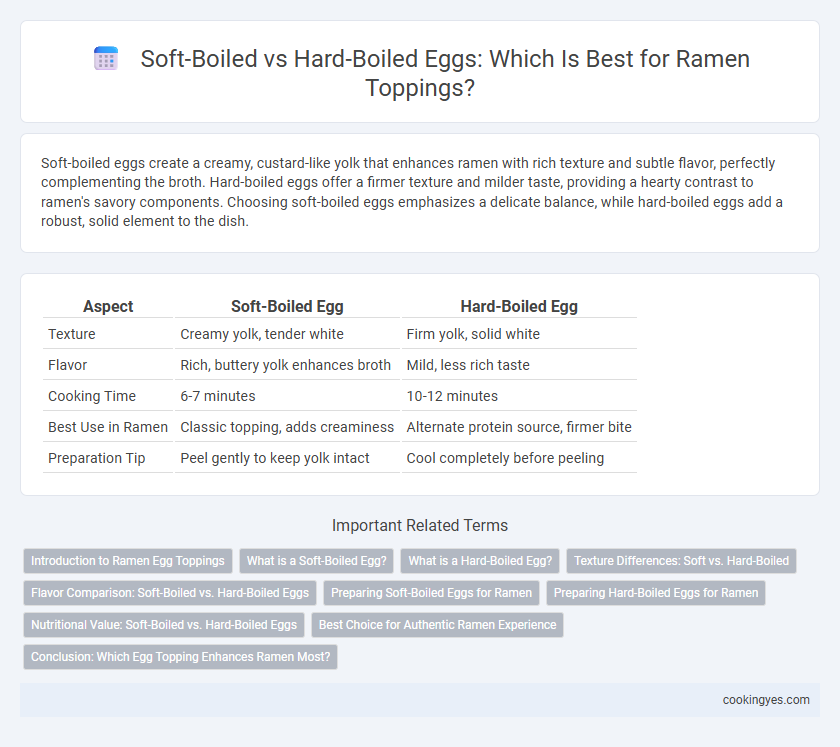Soft-boiled eggs create a creamy, custard-like yolk that enhances ramen with rich texture and subtle flavor, perfectly complementing the broth. Hard-boiled eggs offer a firmer texture and milder taste, providing a hearty contrast to ramen's savory components. Choosing soft-boiled eggs emphasizes a delicate balance, while hard-boiled eggs add a robust, solid element to the dish.
Table of Comparison
| Aspect | Soft-Boiled Egg | Hard-Boiled Egg |
|---|---|---|
| Texture | Creamy yolk, tender white | Firm yolk, solid white |
| Flavor | Rich, buttery yolk enhances broth | Mild, less rich taste |
| Cooking Time | 6-7 minutes | 10-12 minutes |
| Best Use in Ramen | Classic topping, adds creaminess | Alternate protein source, firmer bite |
| Preparation Tip | Peel gently to keep yolk intact | Cool completely before peeling |
Introduction to Ramen Egg Toppings
Ramen egg toppings vary primarily between soft-boiled and hard-boiled preparations, each offering distinct textures and flavors that enhance the dish. Soft-boiled eggs feature a creamy, slightly runny yolk that blends seamlessly with ramen broth, adding richness and depth. Hard-boiled eggs provide a firmer texture and subtle taste, complementing the noodles and broth without overpowering other ingredients.
What is a Soft-Boiled Egg?
A soft-boiled egg has a fully cooked white with a runny or slightly custardy yolk, making it the ideal topping for ramen to enhance texture and flavor. The gentle boiling process, typically around 6-7 minutes, preserves the yolk's creamy consistency that complements the rich broth. Soft-boiled eggs add visual appeal and a silky mouthfeel, distinguishing them from hard-boiled eggs with firm yolks.
What is a Hard-Boiled Egg?
A hard-boiled egg is cooked in boiling water until both the white and yolk solidify completely, providing a firm texture that holds shape well. Often used in ramen toppings, hard-boiled eggs add a rich protein element and contrast with the broth's softness. Unlike soft-boiled eggs with runny yolks, hard-boiled eggs offer a more substantial bite that complements hearty ramen varieties.
Texture Differences: Soft vs. Hard-Boiled
Soft-boiled eggs provide a creamy, custard-like yolk that blends smoothly with ramen broth, enhancing the overall richness of the soup. Hard-boiled eggs have a firmer, crumbly yolk and denser white, adding a contrasting texture that holds shape well in ramen bowls. The choice between soft and hard-boiled affects mouthfeel and flavor absorption, making soft eggs ideal for silky ramen while hard eggs suit heartier, drier broths.
Flavor Comparison: Soft-Boiled vs. Hard-Boiled Eggs
Soft-boiled eggs for ramen feature a creamy, rich yolk that enhances broth absorption and adds a velvety texture, creating a balanced flavor profile. Hard-boiled eggs provide a firmer texture with a milder taste that blends subtly without overpowering other ingredients. Choosing soft-boiled eggs intensifies umami, while hard-boiled eggs offer a more neutral, complementary taste.
Preparing Soft-Boiled Eggs for Ramen
Preparing soft-boiled eggs for ramen involves boiling eggs for exactly 6 to 7 minutes to achieve a custard-like yolk that enhances the dish's texture. After boiling, immediately placing the eggs in an ice bath stops cooking and makes peeling easier, preserving the delicate outer layer. Marinating the peeled eggs in a mixture of soy sauce, mirin, and sake for several hours infuses rich umami flavors that complement ramen broth perfectly.
Preparing Hard-Boiled Eggs for Ramen
Preparing hard-boiled eggs for ramen involves boiling eggs for 9-12 minutes to achieve a fully set yolk, ideal for a firm texture that complements rich broth. Cooling the eggs immediately in ice water stops the cooking process and makes peeling easier, preserving the egg's smooth appearance for presentation. Slicing the eggs neatly before adding them to ramen enhances the dish's visual appeal and provides a satisfying bite that balances with the noodles and broth.
Nutritional Value: Soft-Boiled vs. Hard-Boiled Eggs
Soft-boiled eggs retain more moisture and slightly higher levels of heat-sensitive nutrients such as B vitamins compared to hard-boiled eggs, which undergo longer cooking times that can reduce these vitamins. Both types provide high-quality protein, essential amino acids, and healthy fats, but hard-boiled eggs have a firmer texture that some find better suited for ramen toppings. The balance of nutrients favors soft-boiled eggs for enhanced nutrient retention, while hard-boiled eggs offer convenience and ease of peeling for hearty ramen dishes.
Best Choice for Authentic Ramen Experience
Soft-boiled eggs with a slightly runny yolk are the best choice for authentic ramen toppings, providing a rich, creamy texture that complements the broth's depth. Hard-boiled eggs, while convenient, lack the silky yolk that enhances flavor integration in traditional ramen. The marinated ajitsuke tamago, typically soft-boiled, embodies the genuine Japanese ramen experience with its balanced taste and tender consistency.
Conclusion: Which Egg Topping Enhances Ramen Most?
Soft-boiled eggs, with their creamy, slightly runny yolks, enhance ramen by adding a rich, velvety texture that complements the broth's depth, making them the preferred topping for authentic flavor balance. Hard-boiled eggs provide a firmer texture and milder taste, offering more substance but less flavor integration with the soup. For the most flavorful and texturally harmonious ramen experience, soft-boiled eggs are the optimal choice.
Soft-boiled vs Hard-boiled for ramen toppings Infographic

 cookingyes.com
cookingyes.com